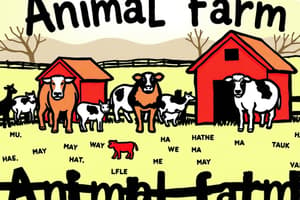Podcast
Questions and Answers
What does the quote 'All animals are equal, but some animals are more equal than others' represent?
What does the quote 'All animals are equal, but some animals are more equal than others' represent?
- The rights of lower classes
- Absolute equality among all
- Hypocrisy and corruption in power (correct)
- The benefits of communism
What is the significance of the song 'Beasts of England'?
What is the significance of the song 'Beasts of England'?
It represents the power of narrative and song in manipulating the hearts and minds of the animals.
The phrase 'Four legs good, two legs bad' reflects a sophisticated understanding of social dynamics.
The phrase 'Four legs good, two legs bad' reflects a sophisticated understanding of social dynamics.
False (B)
What does Boxer’s quote 'I must work harder' reveal about his character?
What does Boxer’s quote 'I must work harder' reveal about his character?
What does Old Major’s statement about all animals coming to a horror signify?
What does Old Major’s statement about all animals coming to a horror signify?
Flashcards are hidden until you start studying
Study Notes
Power and Inequality
- "All animals are equal, but some animals are more equal than others" illustrates the hypocrisy of power dynamics in a supposed equal society.
- Inequity manifests as the privileged few, connected to status, undermining the principle of equality; this reflects the failure of communism to eliminate class systems.
- Real-world parallel: gender pay disparity highlights ongoing inequalities in society.
The Power of Song and Narrative
- "Beasts of England" symbolizes the power of narrative as a tool for persuasion, used to unite and motivate animals.
- Contrasts between the song's hopeful message and the harsh realities faced by characters like Boxer and the windmill's collapse expose manipulation by the ruling pigs.
- Echoes Karl Marx's critique of religion as a means to placate and control the populace; "Golden Future Time" misleads animals into believing in a better future while enduring present suffering.
Simplification and Manipulation
- "Four legs good, two legs bad" serves as an oversimplified slogan, exploiting the uneducated nature of the animals for control.
- Repeated by sheep without understanding, it reveals the ease of manipulation through simplistic concepts.
- Contrasts with the more complex idea of "four legs bad, two legs better," denoting a subtle shift towards a hierarchical understanding of value based on legs and perceived worth.
Exploitation of Labor
- "I must work harder" reflects Boxer's exploitation as an exemplar of brute strength with limited intellectual capacity.
- Boxer's value lies in his ability to work, leading to his oppression while others, like Mollie, are deemed less useful.
- The structure of labor benefits the pigs, who thrive off Boxer's efforts, illustrating how power dynamics allow the lazy to exploit the industrious.
Foreshadowing and Fatalism
- "To that horror, we all must come" emphasizes the fate of animals on a farm: eventual slaughter once they lose productivity.
- Old Major’s warning foreshadows the brutal reality of exploitation and death for animals, potentially mirroring historical conditions for peasants.
- The notion of violence and control by the pigs signifies a deeper systemic oppression, compounded by the threat of the dogs, reinforcing the brutal nature of their rule.
Studying That Suits You
Use AI to generate personalized quizzes and flashcards to suit your learning preferences.




